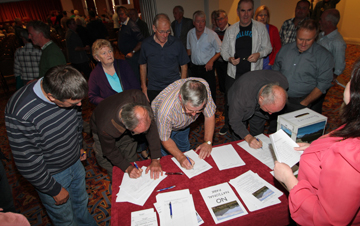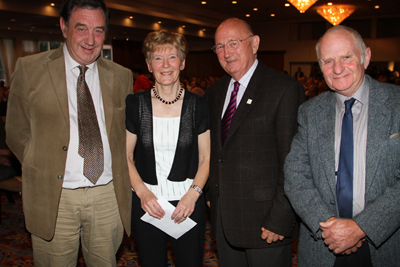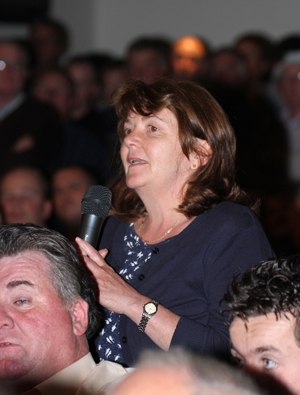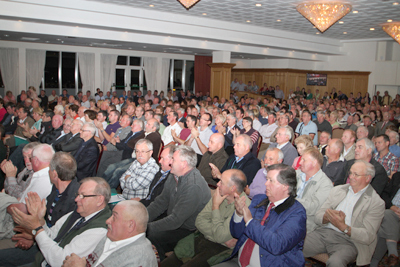THE ‘No Park Campaign’ received a huge boost at the public meeting held in the Slieve Donard Resort and Spa over the issue of establishing a National Park for the Mournes.
Currently Environment Minister Alex Attwood is pressing ahead to bring legislation through the Assembly to set up two national parks in either the Mournes, Fermanagh or Antrim. There is strong opposition in each area for this development.

Campaigner Valerie Hanna had invited speakers from the Brecon Beacons National Park to address the audience where pro-national park voices were in a minority.
Mrs Hanna said addressing the audience: “Large companies don’t locate to national park areas and this designation would be a big disadvantage to the whole Mourne area. B/E Aerospace, the bigghest employer in the area with 800 workers, would never have set up here given a national park was in place. In 2011 B/E Areospace generated £200 million of which £19 million went to the US parent company.
“This is just not a farming issue. Having a second home in the national park could be a status symbol for people in the cities. This will drive up property prices and our young people will find nowhere to live. This will just add to the problems if emigration aleady rife.
“And who pays fro the national park once it is set up? We will all likely end up paying for it through our rates. This development will affect everyone in Northern Ireland. And farmers will certainly feel the pain.
“Also, what does the Minister really mean by saying that allowing greater access to our lands will address ‘wider public needs’? I believe we should follow the example of the French farmers and fishermen – enough is enough. We have wide support across the province and we are asking our politicians not to vote for this proposed piece of legislation in the Assembly.”
Guest Speaker John Thorley, a sheep farmer from the Brecon Beacons, spoke at length opposing the concept of national parks. He said: “I am deeply concerned at this proposal to set up national parks in Northern Ireland. Our experience has been very negative. What we have now is parks owned by bureaucrats whose authority is imposed by politicians.
“It should be the role of elected councils to help manage these parks, not unelected bodies who are not accountable to the stakeholders. We need farms to be producing more not less and these national parks do nothing to add to farming productivity. We have seen a rise in our house prices, an increase in admin jobs in local tourism, creating a new layer of bureacracy.

“Initially I was ambivalent but after several years I have come to strongly oppose national park development. I would like to see their dissolution. If you want to maintain control over your farms I would urge you to oppose the proposed legislation at the Northern Ireland Asembly.
“The original legislation setting up the national parks in 1949 and after indicated it was to promote and protect the environment and communities, and add to enjoyment of public access. However, our experience shows that the park’s authority has been impossible to work with regarding planning matters. There are many instances where plans have been refused even after appeals. It has been a constant battle. One demand by the planners was asking us to remove our satellite dishes. We saw this as an infringement of our human rights. And refused.
“National park planners are a law unto themselves with as much tact as a rabid rottweiler. For example, we asked for a single wind turbine to test it regarding pollution and we were allowed one… minus the blades!”
Mr Thorley cited many delays in resolving planning issues and added the increased costs to farm businesses in sometimes going to planning appeals and being turned down. “My own daughter was breeding shire horses and had to have a quarantine box built measuring five metres square. The vets and the Shire horse society agreed it was essential for the process of the mare giving birth, yet the planners blocked it. It cost £5000 in an appeal to win the argument after two years.
“Our experience is that senior staff tend to move in to the area and are not in tune with what is going on. For example, they did not understand the concept of shared grazing and how farmers resolve this. If problems arise it can affect community divisively for generations.
“I therefore ask you to think long and hard about the present national park proposals and siding with an unelected bureaucracy.”
The audience were much in support of the speaker and Seamus Maginn, Co Down UFU Chairman, indicated the wider support of the farming community opposing the proposed bill in the Assembly.

However, Audrey Byrne, Chairwoman of the Newcastle and District Chamber of Commerce, took a different position explaining: “Newcastle business people are fighting to hold on to their businesses at the moment. If we don’t get a national park, can you tell me where we get the investment for this area to support jobs and businesses? There is no industry in Newcastle, it depends much on tourism. We have to look at the bigger picture. We should try and set up a national park that is unique to the Mournes.”
Other comments.
Edwin Harris, Brecon Beacons farmer, said: “We own the land. It is not national… and it is not a park. Since the setting up of the Brecon Park, we have seen a drop in tourism, a reduction in the number of B&B’s and a drop in the volume of visiting traffic in the area. Eventually the land will start to deteriorate if not properly managed by farmers. I am quite prepared invite you over to see for yourselves what we are talking about. We will back up what we say.”
There were a number of passionate pleas from the audience and Mournes farmer Eddie McAteer said: “We must oppose land-lordism and not bring it back to Ireland”
Newry and Mourne Councillor Henry Reilly: “The national park will be a statutory consultee and with the increasing powers of local councils, the countryside will come back into local control after 30 years.”
Local farmer: “It is not a national park that Newcastle needs but a car park”.
Speakers from the farming community in Fermanagh and Antrim were also represented at the meeting and they voiced their disapproval of the development of national parks in Northern Ireland. One speaker said: “This is really all about nationalising the property that we own. There are more way sto stimulate tourism that set up a national park.”
South Down MP Margaret Ritchie (SDLP) speaking at the meeting said: “The biggest issue is how we build prosperity – we do need to adminster a balance for all. There has to be a fair price at the farm gate for farm produce.
“Regarding tourism in a Mourn’s national park, already many farmers are making a contribution to tourism… I am a proponent of farmin and tourism. I understand this is a very contentious issue… there are many opposed and many in favour. We want the community to prosper, so we therefore need to step back from fear and panic being instilled in people. We don’t want this to happen.
“I will bring the matters raised here tonight to Minister Attwood and also I want to see people getting round the table and talking. We don’t want people making sacrifices and leaving the region.”

South Down MLA Willie Clarke (Sinn Féin) said: ‘What we are doing as a party is to talk to the stakeholders and present the facts. I don’t want anyone coming to me in te future saying ‘why didn’t you tell us that?’ Audey Byrne is right. This area is not marketed properly. A few thousand pounds is not enough to brand a national park, nor the Newcastle area. We will be taking this to the Assembly and looking at it very closely. In the end we will let the people decide.”
South Down MLA Sean Rogers (SDLP): “I was reared in a small farm in the Upper Mournes. I’m with the local farmers. I am disappointed that our minister is not here tonight. We don’t need any division in our community. I will make clear your views to Minister Attwood.”
* * *
This matter will rumble on for some time to come. There are always two sides to an argument, and at the end of the day, informed judgements will have to be made. That involves fairness on both sides to listen to arguments and positions, and step back from the brink.
It is time for some serious talking by all parties and there needs to be an objective public mechanism for parties to interface away from the glare of the media to arrive at a positive accommodation.
The Assembly must then finally decide.

























